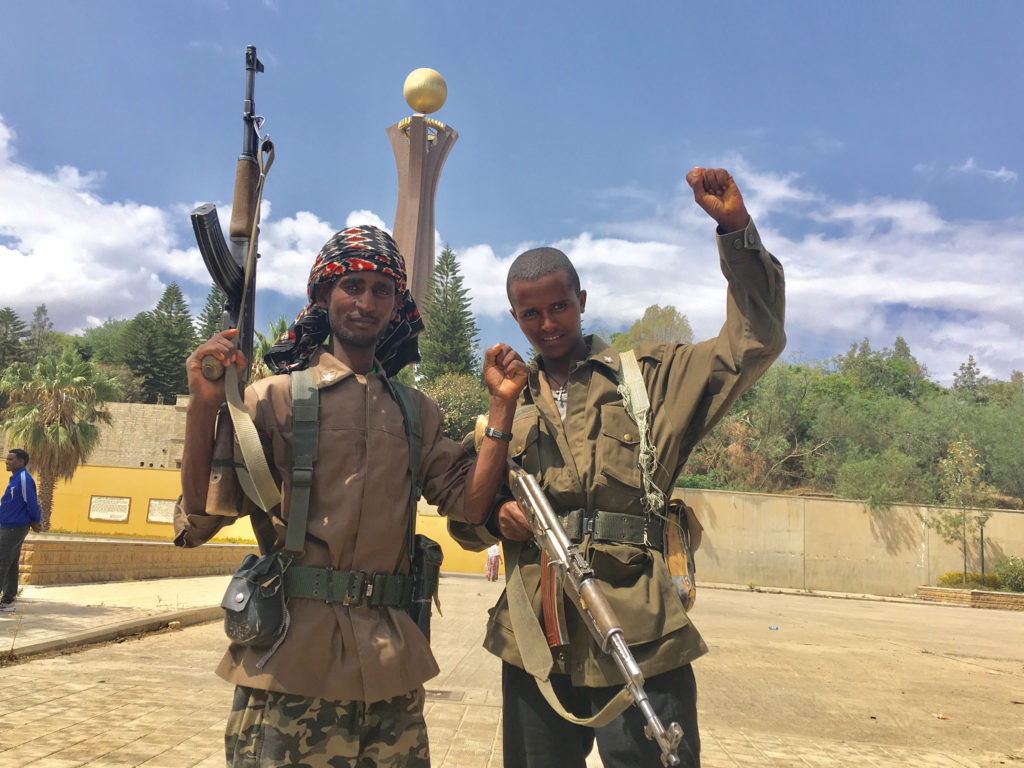RADAR

WHAT ARE THE CHANCES FOR PEACE IN ETHIOPIA’S TIGRAY CONFLICT?
As the war in Ethiopia comes to a head, opponents of Prime Minister Abiy Ahmed are forging an alliance for a “safe transition”
BY MARTINA SCHWIKOWSKI | MEDIA EXPERT IN AFRICA, DEUTSCHE WELLE (DW)
“The situation in Ethiopia is currently very perilous, probably the most dangerous moment in the country for decades,” said Murithi Mutiga, International Crisis Group Project Director for the Horn of Africa, based in Nairobi, Kenya. “The primary issue is that all sides have decided that they can settle this conflict militarily. The Tigrayan forces have gained strength. They seem determined to make a decisive move that could either lead to the end of the siege in Tigray or to the collapse of the Abiy government.”
For its part, the government of Abiy Ahmed has stepped up its war rhetoric. Facing a possible advance on the capital, Addis Ababa, he is calling for a general arming of the people, and all civilians to join the fight. According to observers, there have been busloads of forcibly recruited teenagers and clampdowns during which Tigrayans still staying in the capital were arrested.
Abiy ‘can flee and go into exile
The Ethiopian Army and troops from Tigray siding with the Tigray People’s Liberation Front (TPLF) have been battling for the region in the north of the country for more than a year. Voluntary fighters have joined both sides. In the meantime, the TPLF has received reinforcement from the Oromo Liberation Army (OLA) and claims to have made territorial gains in the course of its advance on the capital.
TPLF and OLA have announced the formation of an alliance along with seven other opposition groups—with the aim of reversing “the harmful effects of the Abiy Ahmed rule” and precipitating a “safe transition” for the country.
Aby, winner of the 2019 Nobel Peace Prize, declared a state of emergency. He labelled TPLF leaders as terrorists, “a cancer,” or “weeds.” The current fight was no military challenge for the troops of the Tigray regional government.
Willingness to win
Why has the TPLF campaign been so successful? According to Kjetil Tronvoll, Norwegian peace researcher, Abiy wronged the national army dominated by Tigrayans when he came to power. “He arrested 17 000 soldiers and officers in the chain of command and incapacitated his own army. [As he is] from the Oromo ethnic group, he could not trust them,” he said
“The troops from Tigray have a stronger fighting morale and the will to win. The TPLF are disciplined and highly educated people, not peasants, as in the resistance war. They are recruiting doctors and high school graduates, and they believe in their cause,” he said.
“In addition, the survival of their families is at stake. In the face of a situation like this, international efforts came too late and, worse still, most diplomats are unfamiliar with the complexity of Ethiopia, with the people, with the sentiment of the parties,” said Tronvoll.
Bayisa Wak-Woya, a former UN employee from Ethiopia, also blames the poor diplomacy for the setback. Many diplomats, he said, do not know enough about the different traditions and cultures of the country and were, therefore, failing in their mediation efforts. “It is very difficult to know what is happening at the warfront in Ethiopia now—transparency is a rare commodity in that country. One thing, however, is certain: civil wars are different from wars of aggression. In the former, maintaining the state’s sovereignty is a non-argument. What are human rights violations for some is maintaining law and order for others. This makes it difficult to design a dignified exit [from the fighting] for the parties involved,” he said.
Need of dialogue
“External powers […] should refrain from taking sides and putting pressure on the parties in the conflict. So far, the diplomatic talks failed to bear fruit, because the international community started to condemn parties. Not a good start,” said Wak-Woya, who, nonetheless, is still hopeful that peace can be brought to the region.
According to Wolbert Smidt, ethnohistorian and expert on Ethiopia, the only formula for peace is a national dialogue involving all ethnic and regional political groups. “No reform, no matter how idealistic, can work if you don’t integrate stakeholders of central importance—and that political process collapsed years ago. That means that in the short term, we only have the option of stopping the war, so that a transitional government can be established. It is only on that basis that a longer civil process can be set in motion,” he said.
